What is Justin Bieber's Net Worth?
Justin Bieber is a Canadian pop singer who has a net worth of $200 million. Justin Bieber emerged as a music phenomenon after being discovered on YouTube at age 13 by talent manager Scooter Braun, who connected him with Usher. His debut EP "My World" (2009) yielded multiple hit singles, making him the first artist to have seven songs from a debut album chart on the Billboard Hot 100.
His first full-length album, "My World 2.0" (2010) featured the breakthrough single "Baby," which became one of the highest-certified singles ever. Bieber's early success was characterized by his distinctive hairstyle, high-pitched vocals, and massive teenage fanbase known as "Beliebers."
Throughout the 2010s, Bieber evolved from teen pop idol to mature artist with albums "Believe" (2012) and "Purpose" (2015). "Purpose" marked a significant artistic evolution with hits like "Sorry," "What Do You Mean?" and "Love Yourself," showcasing electronic dance influences and more adult themes.
After a brief hiatus, Bieber returned with "Changes" (2020) and the more critically acclaimed "Justice" (2021), which featured hits like "Peaches" and "Holy," demonstrating his continued commercial viability and artistic growth.
Beyond music, Bieber has expanded his brand through fashion (Drew House clothing line), fragrance lines, and the documentary series "Justin Bieber: Seasons." His personal life, including his marriage to Hailey Baldwin in 2018 and his openness about mental health struggles and faith, has remained in the public spotlight.
With over 150 million records sold worldwide, multiple Grammy Awards, and numerous chart records, Bieber has transformed from YouTube sensation to one of the best-selling music artists of all time, successfully navigating the transition from child star to adult performer despite very public personal challenges along the way.
In touring years, Justin is one of the highest-paid entertainers on the planet, easily bringing in $60-80 million personally from all income sources. In December 2022, Justin inked a deal to sell his music catalog rights for $200 million. Justin Bieber was just a Canadian pre-teen posting videos of his songs to the internet back in 2007/2008. Then Scooter Braun, a former marketing executive and later Bieber's manager, stumbled across his videos. The rest is history.
Early Life
Bieber was born on March 1, 1994, in London, Ontario. His parents never married, and his mother was underage when she gave birth, so Bieber's maternal grandmother and step-grandfather helped raise him. Growing up, he learned to play the piano, drums, guitar, and trumpet. He graduated from St. Michael Catholic Secondary School in Stratford, Ontario, in 2012.
In early 2007, at the age of 12, Bieber sang Ne-Yo's "So Sick" in a local Stratford singing competition, placing second. His mother posted a video of the performance on YouTube so friends and relatives could see it, and continued to upload Bieber singing covers of songs.
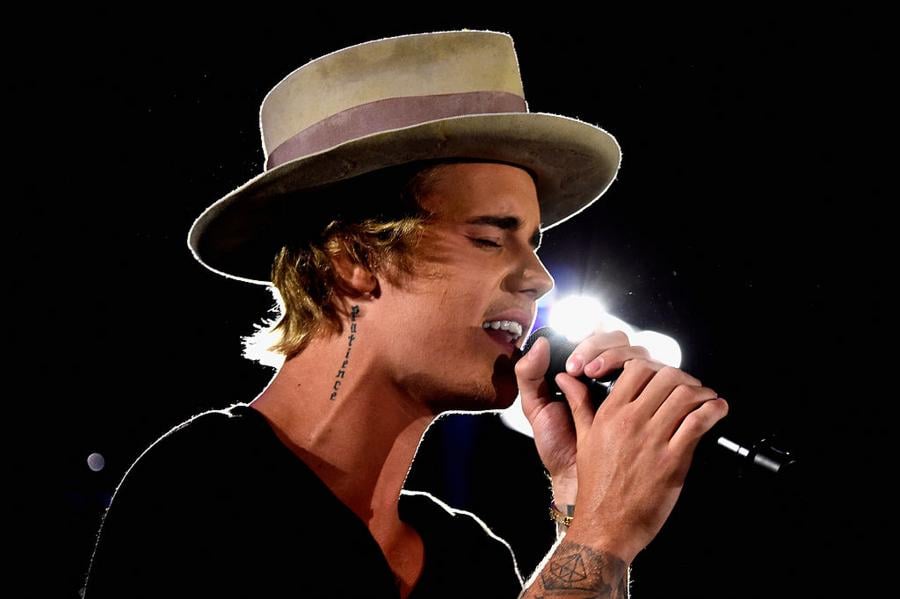
Frazer Harrison/Getty Images
Breakthrough
While searching for videos of a different singer, record executive Scooter Braun accidentally clicked on one of Bieber's 2007 videos. Impressed with what he saw, he tracked Bieber down and convinced his mother to let him take Bieber to Atlanta, where he recorded some demo tapes. A week after arriving in Atlanta, Bieber was singing for R&B star Usher.
Soon after, he was signed to Raymond Braun Media Group (RBMG), a joint venture between Braun and Usher, who helped him audition for The Island Def Jam Music Group. Bieber signed with Island Records in October 2008 and moved to Atlanta with his mother so he could continue to work with Braun and Usher. Braun became Bieber's manager in 2008.
In 2010, Bieber released a two-part debut album entitled "My World" and "My World 2.0". His promotional activities for the record included performances on several live shows such as "The Today Show," The Wendy Williams Show," "Good Morning America," and "The Ellen DeGeneres Show." Less than two months after its release, "My World" sold over one million albums in the US alone. To date, that album has been certified 5x platinum by the RIAA. "My World" was the first debut album to have four singles (One Time, One Less Lonely Girl, Love Me, and Favorite Girl) on the Billboard Top 40 prior to the album's release. "My World 2.0" debuted at number one on the U.S. Billboard 200 with a total of 698,000 copies sold in the first three weeks of its release. This accomplishment made Bieber the youngest solo male artist to top the chart since Stevie Wonder in 1963. The single "Baby," which featured rapper Ludacris, quickly became Justin's best-selling single of all time, with more than 15 million singles sold around the world. His second album, a set of Christmas songs called "Under the Mistletoe," sold 2 million copies. His third album, 2012's "Believe," sold 3 million copies worldwide.

Justin Bieber Net Worth – (MIGUEL MEDINA/AFP/Getty Images)
Music Career
As Bieber's star continued to grow, his 3D part-biopic, part-concert film "Justin Bieber: Never Say Never" was released in February 2011. The film topped the box office with an estimated gross of $12.4 million on its opening day from 3,105 theaters and grossed a total of over $98 million worldwide. Along with the film, Bieber released the album "Never Say Never – The Remixes" (Feb. 2011). In June 2011, he was featured as number two on the Forbes list of Best-Paid Celebrities under 30, having made $53 million in 12 months.
The Christmas album "Under the Mistletoe" was released in October 2011 to great success, followed by "Believe" in June 2012 and "Believe Acoustic" in January 2013. "Justin Bieber's Believe," a follow-up to his first film, was released in December 2013, also directed by Jon M. Chu. His February 2015 song "Where Are Ü Now" won a Grammy Award in 2016 for Best Dance Recording. Bieber earned a Guinness World Record for the youngest male artist to debut at the top of the Billboard Hot 100 chart with his single "What Do You Mean" from his album "Purpose" (Nov. 2015). His follow-up album, "Changes," was released on February 14, 2020.
Bieber released his sixth studio album, "Justice," in 2021, marking a return to his pop roots. The album made him the youngest solo artist to have eight US number-one albums, passing Elvis Presley. In January 2022, he set the then-record for most monthly listeners in Spotify history at 94.68 million.
Other notable single and collaborations he has worked on include "Cold Water" (2016) with Major Lazer and MØ, "Déjà vu" (2016) with Post Malone, "Despacito" (2017) with Luis Fonsi and Daddy Yankee, "I'm the One" (2017) with Quavo, Chance the Rapper, Lil Wayne and DJ Khaled, "Bad Guy" (2019) with Billie Eilish, and "Up at Night" by Kehlani.
As of this writing, the music video for "Baby" has more than 2.9 billion views on YouTube. His music video for the song "Sorry" has more than 3.6 billion views. In total, he has 71+ million subscribers on YouTube.
In 2023, Justin paused touring due to health issues related to Ramsay Hunt syndrome, a condition that temporarily paralyzed part of his face. He canceled the remaining dates of his "Justice World Tour," originally launched in 2022.
Catalog Sale
In late 2022, it was revealed that Justin Bieber was in advanced talks to sell the rights to his music catalog. The buyer was Hipgnosis Songs Capital, a publicly traded music investment fund backed by Blackstone. The deal was finalized and announced in January 2023, with a reported value of $200 million, making it the largest acquisition in Hipgnosis history at the time—roughly double what the firm had paid Justin Timberlake earlier that same year.
The deal included Bieber's publishing rights, songwriting credits, and artist royalties for recordings released prior to 2022. It covered more than 290 titles, including global hits like "Baby," "Sorry," "Love Yourself," and "Peaches." From that point forward, Hipgnosis would collect the royalties from those works, essentially giving them a slice of every stream, radio play, or commercial use of Bieber's back catalog.
Notably, the sale did not include Bieber's master recordings, which remain owned by Universal Music Group. That means Universal continues to profit from album and song sales, while Hipgnosis profits from songwriting and royalty revenue.
The deal gave Bieber a substantial upfront cash windfall, signaling a shift in his career toward long-term wealth management and possibly lower musical output. It was widely viewed as a move to lock in the value of his peak-era work while still in his 20s—a rare decision among artists of his age.
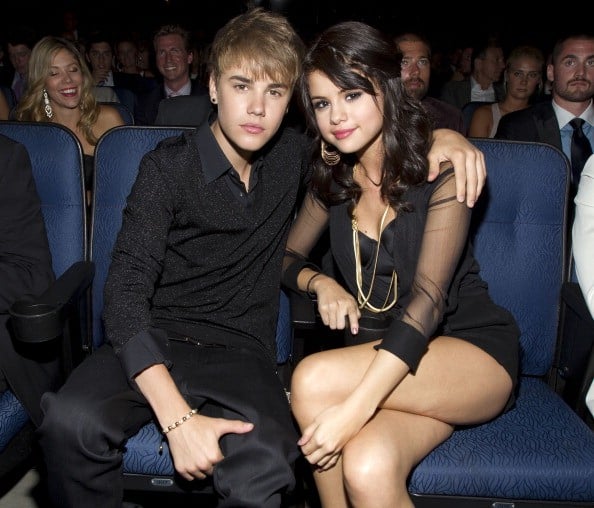
Christopher Polk/Getty Images for ESPN
Personal Life
In December 2010, Bieber entered into a high-profile relationship with actress and singer Selena Gomez. The pair had an on-and-off relationship until March 2018.
During one of his breaks from Gomez, Bieber had briefly dated Hailey Baldwin between December 2015 and January 2016, and the couple reconciled in May 2018. They became engaged in July 2018 and had an official wedding ceremony on September 30, 2019. Hailey is the daughter of actor Stephen Baldwin, the brother of Alec Baldwin.
In 2024, Hailey launched a successful skincare line, Rhode, which made headlines as a major celebrity beauty brand. Justin occasionally promotes Rhode on social media and appears in select campaigns, suggesting ongoing partnership synergy.
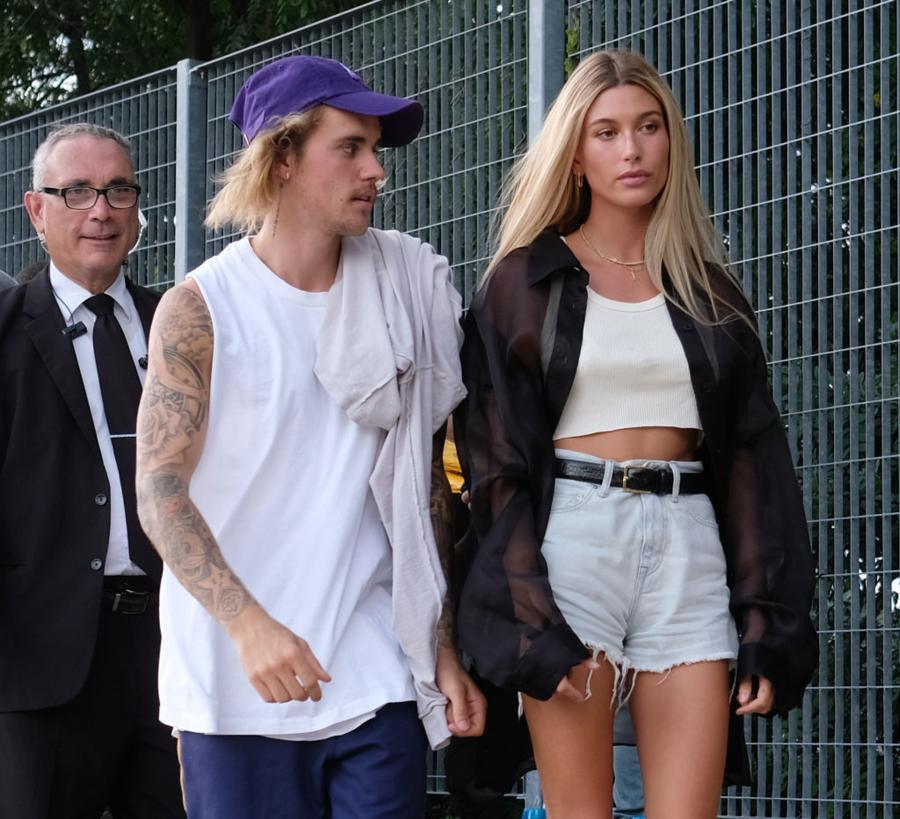
Nicholas Hunt/Getty Images
As a Canadian citizen, Bieber is reported to possess an O-1 visa for temporary resident status in the United States, although September 2018 reports from TMZ allege he has begun the process of becoming an American citizen following his marriage to Baldwin.
Although he has received extraordinary success in the music business, like many young celebrities, he has had his share of scandals in the press. In 2014, he was arrested for a DUI, drag racing, and resisting arrest; he was also exhibiting some erratic behavior around the time of his arrest, and his popularity briefly dipped as a result of his actions.
In March of 2015, Justin volunteered to be roasted by Comedy Central. Some of the celebrity roasters included Kevin Hart, Snoop Dogg, Shaq, Martha Stewart, Ludacris, and many more. When it was all said and done, Justin ended the show with a pretty clever line:
"What do you get when you give a teenager $200 million? A bunch of has-beens calling you a lesbian for two hours."
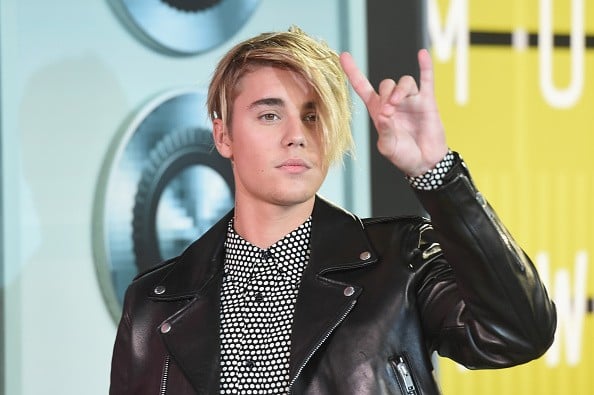
Jason Merritt/Getty Images
Business Ventures and Endorsements
Justin Bieber has leveraged his global fame into a wide array of successful business ventures and endorsement deals. Over the years, he has worked with major brands including Proactiv, Nicole by OPI, Walmart, Adidas, Calvin Klein, and Schmidt's Naturals. His Calvin Klein underwear campaign in 2015 was a particularly high-profile moment that helped redefine his image as an adult pop icon.
He has also released several successful fragrances, including Someday (2011), Girlfriend (2012), and Justin Bieber Collector's Edition (2014), generating millions in retail sales.
In 2019, Bieber launched his own streetwear label, Drew House, which features oversized silhouettes, pastel colors, and its now-iconic smiley face logo. Drew House has evolved from a niche brand into a cult fashion label, worn by celebrities like Timothée Chalamet and Tyler, the Creator, and is now stocked by high-end retailers such as SSENSE and Farfetch.
In 2020, he collaborated with Crocs on a limited edition line called Crocs x Justin Bieber, which sold out almost instantly. A follow-up collection was released in 2023, along with matching apparel, further cementing his status as a fashion tastemaker.
Bieber has also pursued meaningful impact ventures. In December 2022, he co-founded Generosity, a clean water technology company focused on providing refillable, sustainable water solutions at concerts and public venues. The brand's mission aligns with Bieber's growing interest in environmental and social causes.
Other brand partnerships have included collaborations with Tim Hortons on the limited-edition "Timbiebs" donut holes and merchandise line, and with Vespa, launching a co-branded electric scooter and apparel collection in 2022 and again in 2023.
In the world of crypto and digital collectibles, Bieber made headlines in early 2022 when he paid $1.3 million for a Bored Ape NFT. By late 2023, that investment had reportedly dropped in value by more than $1.2 million amid the broader crypto downturn. He has since been quiet on further NFT or Web3 ventures.
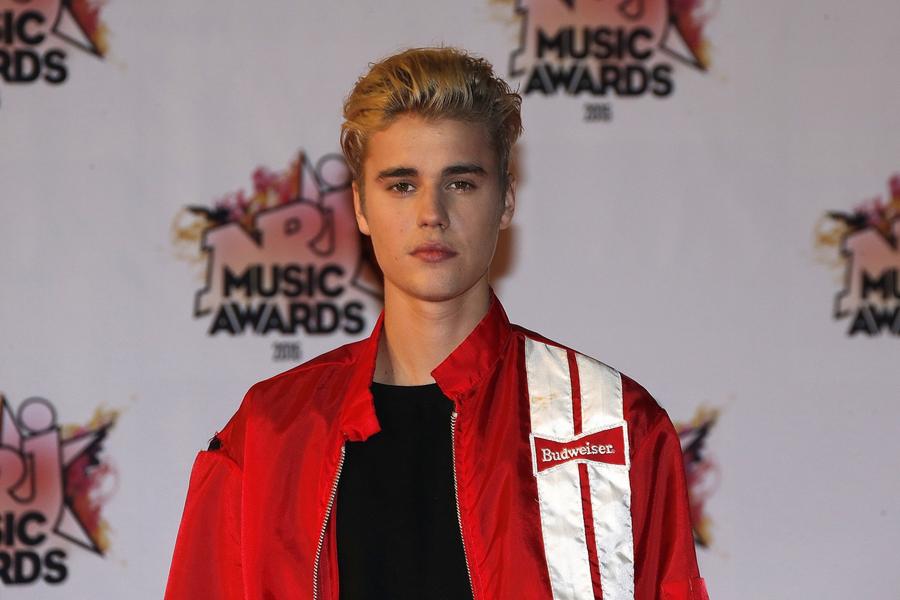
(VALERY HACHE/AFP via Getty Images)
Real Estate
In 2012, an 18-year-old Justin paid $6.5 million for a home in the exclusive Calabasas gated community called The Oaks. It was at this house where Justin had several run-ins with neighbors. Neighbors frequently complained about his loud parties and friends speeding through the quiet streets. In 2014, a neighbor's security cameras caught Justin throwing eggs at a house, causing thousands of dollars worth of damage. The incident resulted in Justin being briefly detained at his home while police entered his home with a felony search warrant. After paying $80,000 to settle the controversy, Justin sold the home in 2014 for $7.2 million to Khloe Kardashian.
Over the next five years, Justin lived somewhat of a vagabond life, renting home after home in various parts of the world. For example, during much of 2019, they were spending a mind-altering $100,000 per month to rent a home in Toluca Lake, California.
In March 2019, Justin paid $8.5 million for a Beverly Hills mansion. It was sold fully furnished in 2021 for $7.995 million.
In August 2020, Justin paid $28.5 million for a new home in Beverly Hills. This new Beverly Hills home is located high up in the mountains of Beverly Hills, within an ultra-exclusive gated community called Beverly Park. Nearby neighbors include Denzel Washington, Eddie Murphy, Rod Stewart, and Sylvester Stallone, to name a few. Two years prior to the Bieber purchase, the home was listed for $42 million. The estate covers 2.5 acres and has an 11,000-square-foot mansion.
Justin and Hailey also own a lakeside home in Ontario worth $5 million.
/2021/07/bieber.jpg)
/2011/05/GettyImages-862973432.jpg)
/2017/09/GettyImages-624765218-1.jpg)
/2020/01/usher2.jpg)
/2018/07/Hailey-Baldwin-1.jpg)
/2018/07/jeremy-biber.png)
/2021/08/dov-charney.jpg)
/2021/06/bobby-bonilla.jpg)
/2015/08/Petra-Kvitova.jpg)
/2021/09/Jessica-Hahn.jpg)
/2010/01/GettyImages-149907344.jpg)
/2023/05/Jimmy-Swaggart.jpg)
/2021/07/jim-bakker.jpg)
/2015/12/GettyImages-56543209.jpg)
/2015/05/GettyImages-463011946.jpg)
/2020/01/Tammy-Faye-Messner.jpg)
/2021/11/rich-vos.jpg)
/2021/07/bieber.jpg)
/2017/09/GettyImages-624765218-1.jpg)
/2022/11/GettyImages-1370384303.jpg)
/2024/04/Screenshot-2024-04-11-230211.jpg)
/2016/11/GettyImages-535290970.jpg)
/2015/06/usher.jpg)
/2019/06/scoot.jpg)
/2020/02/drake-net-worth.jpg)